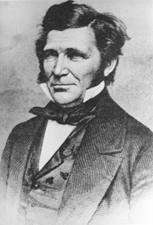William Crosby Dawson
William Crosby Dawson (born January 4, 1798 in Greensboro , Greene County , Georgia , † May 5, 1856 ibid) was an American politician of the United States Whig Party . From 1836 to 1841 he sat for the US state Georgia in the US House of Representatives . Between 1849 and 1855 he represented Georgia in the US Senate .
biography
Dawson was born in Greensboro to George Dawson, Sr., and Katie Ruth Marston Skidmore. After being informed by the Reverend Dr. Cumming had been privately tutored, he attended the County Academy in his hometown. He then went to the University of Georgia . He took his law degree with Thomas W. Cobb and finished it at Litchfield Law School . In 1818 he was admitted to the bar and practiced from then on in his hometown. In 1819 he married Henrietta M. Wingfield. They had eight children together.
From 1821 he was a clerk in the Georgia House of Representatives . He held this post for twelve years. In 1828 he began to write a standard work on the laws of the state of Georgia, which was first published in 1831. In 1834 and 1835 he held his first political mandate as State Senator . In 1836 he was involved in the war against the Seminoles . In 1836, Dawson was elected to the US House of Representatives as the successor to the late John E. Coffee . He was re-elected three times. In 1841 he was a Whigs candidate for governor of Georgia. However, he could not prevail against Charles James McDonald . Dawson himself attributed the defeat to his work in Congress and then resigned. In 1845 he was appointed judge of the Ocmulgee Circuit Court by Governor George Walker Crawford . However, Dawson only held the post until a successor was elected.
In 1847, Dawson was elected as a representative of Georgia to the Federal Senate in Washington, DC . There he was Chairman of the Committee on Claims during his six-year term . He did not succeed in re-election.
From 1843 Dawson became involved as a Freemason . After the end of his political career he worked again as a lawyer in Greensboro until his death in 1856. He was buried in Greensboro Cemetery .
The places Dawsonville and Dawson and Dawson County in Georgia are named after him.
Web links
- William Crosby Dawson in the Biographical Directory of the United States Congress (English)
- William Crosby Dawson in the database of Find a Grave (English)
| personal data | |
|---|---|
| SURNAME | Dawson, William Crosby |
| BRIEF DESCRIPTION | American politician (Whig Party) |
| DATE OF BIRTH | January 4, 1798 |
| PLACE OF BIRTH | Greensboro , Georgia |
| DATE OF DEATH | May 5, 1856 |
| Place of death | Greensboro , Georgia |


